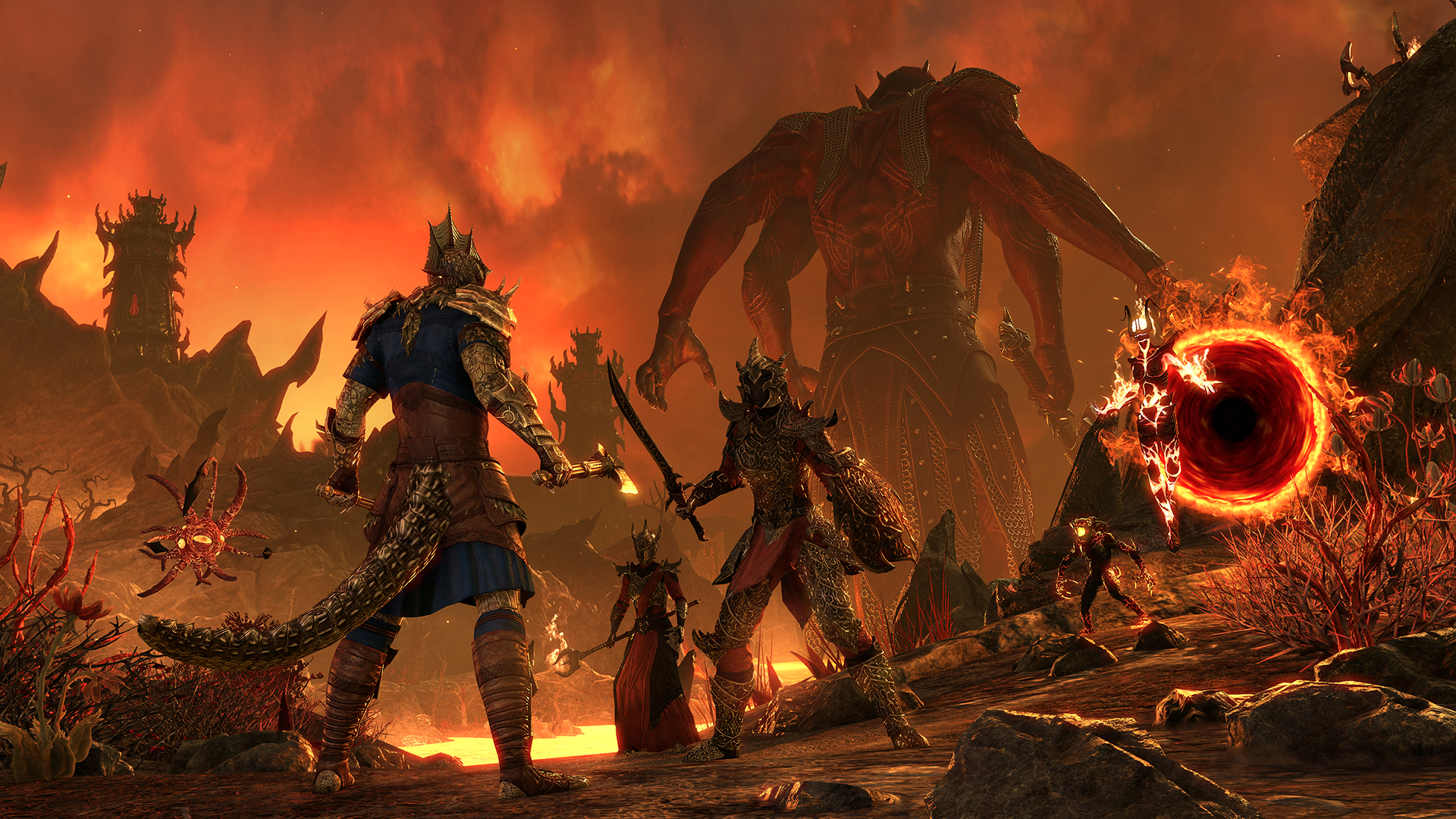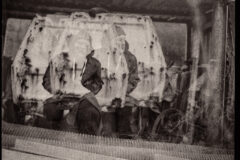As SPIN originally discussed with Elder Scrolls Online’s Creative Director, Rich Lambert, back in February, the latest expansion for the massively multiplayer online role-playing game (MMORPG) sends players straight to Hell — or at least the Elder Scrolls version of it. But while the first glimpses of the Blackwood chapter were available back then, the full package wasn’t released to the public until recently.
While it might not be quite as reminiscent of The Elder Scrolls IV: Oblivion as the Morrowind chapter was of its predecessor, the central piece of the Gates of Oblivion year-long storyline brings players square into a confrontation with the Daedric Prince of Destruction, Mehrunes Dagon. It’s a demonic adventure from another world, and serves as the perfect counter to much of Elder Scrolls Online’s more traditional high fantasy setting.
Now that the Blackwood chapter is officially out, SPIN sat down with the game’s long-time Audio Director, Brad Derrick, to discuss what’s gone into the latest additions musically, the massive scale for a score of a game this size, and what it’s been like to compose for the same title for over a decade.
SPIN: Some of the expansions really let you take the music of the Elder Scrolls universe in different directions, so what was your approach to changing things up for Blackwood?
Brad Derrick: Unlike some of the others that have been greater departures from the classic Elder Scrolls style, this one is a little more rooted in some of the traditional elements of Oblivion, the Deadlands, and things like that. Of course, we’re expanding on what’s come in the previous games, so musically, it was sort of a parallel path to where the soundtrack for this chapter sits with a lot of the “classic” Elder Scrolls music. We spent a lot of time in the Deadlands and in dark and nasty places, so I got to explore that a good amount. It’s a lot of dark and nasty music to go with all the dark and nasty spaces. Other expansions have been wildly different. Take something like Clockwork City, where the music could be pretty far from what you would call “classic” Elder Scrolls. This one’s a little more straightforward, but it’s kind of like writing a sequel for a lot of characters that you already love and are familiar with. You get to take them into new and exciting places.
What has it been like to not just create the overall score for the game, but design music for each individual zone and chapter within it?
Well, you can look at it at two different levels of granularity. From chapter to chapter — which is year to year — I get the opportunity to potentially develop or expand on what those boundaries are musically. I’m working within a certain set of parameters so that it sounds recognizable as Elder Scrolls music — so I can’t go all banjos and dubstep or something like that — but I can push things gently here or there. You want the listener to feel like it’s new but familiar. But within a given chapter, from location to location or from story point to story point, there’s ample opportunity to do similar things, mix it up, and keep it varied and interesting so the player doesn’t tune it out. Some opportunities readily make themselves available, like if you’re in a beautiful overland space versus in the underworld in a demonic dungeon. When I’m out in the pretty trees and rivers and stuff, I’m going to make some nice, lovely, lilting, happy melodies. When I’m down in the pits of Hell, I’m going to do something completely different. Those deviations allow me to indulge different aspects of what it is to write music. When I’m doing the crazy underworld stuff where literally anything goes, that becomes more of an exercise in sound design because traditional melodic and harmonic elements can go out the window. It’s more about sculpting and shaping abstract and esoteric sounding things to create a visual experience for the player — which creates even greater contrast when you emerge into the happy world of sunshine and babbling brooks and you hear a flute playing a pretty melody.
From a sheer scale perspective, how do you even create enough music for a game that has thousands of hours worth of content in it?
There’s a lot that goes into that. Some of the things that we do are very evident. When something dramatic happens, we play what we call a “stinger” or a “fanfare.” It’s just some sort of short musical flourish to underscore the events of the game and give it some context when the bad guy dies or you crest some unbelievable vista or whatever the case may be. Those are very easy things to say “We need a hook here, because X, Y and Z is going to happen, and we want to support that musically.” Those kinds of things are very obvious to a player, but there’s a lot that goes on in a much more subtle fashion.
One of the things that I stumbled upon early on is this idea that I refer to as “micro-scoring” or “micro-arrangements” which is a given piece of ambient music that tends to be 5-6 minutes long and associated with a particular zone. That piece of music is not a linear, repetitive, predictable verse-chorus-verse kind of thing. Those entire 6 minutes are non-repetitive, very organic, constantly shifting and developing, and not hitting you over the head with catchy hummable hooks. You wouldn’t walk away from your first play session humming the thing because it wasn’t pounded into your head over and over again for 20 minutes, but when you’ve heard it for 50 hours, it hasn’t worn out its welcome yet for the same reason. Because it changes moment to moment, it’s always evolving and sort of creates a false sense that the music is responding on a much more granular level to everything you do. In some cases, the changes are literally in the code of what you’re doing, but for the most part, it’s just the fact that the music is always changing a little bit.
Considering that you’ve been working on this game for over a decade now, how has your approach changed to creating music and sounds for such a huge project?
Honestly, it started off with a bit of a misstep. I came on in 2009 — 4-5 years before we launched — and we knew the size and scope of the game at launch but that was too early to talk about the roadmap for the years after launch. I was just trying to figure out how much we needed in the way of musical variety and assets for launch. In that timeframe, the audio team was extremely small. Initially, it was just myself, and then in the years leading up to launch, we hired a few more people, but we were still a very small team. At that time, I was still doing sound design, some sound effects work, and voiceover stuff in addition to writing music and being the audio director — so I was a busy guy. I underestimated just how much music would be enough at launch, and frankly, it wasn’t enough. We produced about 3-4 hours of music at launch, and it was like having one little knife full of peanut butter and trying to cover this entire big piece of bread. I was spreading it real thin and trying to figure out where I was going to use all this stuff, but it just wasn’t enough. I knew that, and I heard that from the players after launch that it needed more music.
The plan was always to continue to update content, so I took it upon myself to be really aggressive about providing additional music at every opportunity. Every chapter we do, I put in a whole bunch more music. We do updates between the chapters, I insert new music. Sometimes there are updates that don’t call for new music at all, but I’ve got a free day or two, so I write another piece of music for a zone that’s been live for years now — which is all the more reason to throw a little fresh blood in there. Nobody asked for it — and it doesn’t necessarily even need it — but why not give another piece of music to Auridon, where the people have been listening to the same music for years now. They go in there one day and all of a sudden there’s 6 more minutes of music they’ve never heard before, and that’s a pretty nice little treat to throw them. So yeah, I sort of underdid it at the beginning, and I have been overcorrecting ever since by putting as much music as possible in the game.
All these years later, do you ever get tired of creating music for the Elder Scrolls universe?
Honestly, it hasn’t gotten tiring at all for a couple of reasons. First and foremost, each chapter affords an opportunity to explore something new. Sometimes it’s a subtle shift. Sometimes it’s a radical shift. I get to stretch my wings pretty much however I want to. I have enough sense to not write something that’s so out of left field that somebody has to tap me on the shoulder and be like “Nope, we’re not doing that,” but I get to try out pretty much whatever I want as long as it still fits within the definition of what Elder Scrolls music is.
Secondarily, because I’m an in-house composer, I’m involved from the very beginning all the way through to the very end — from the very first stages of concept art, through demos, recording, production, post-production, and integration, I make all of the decisions about how and where the music is used. I’m the last guy to test it before it goes out the door. All of that helps keep it really fresh. If I was just a guy sitting in front of a piano writing music, that’s all well and good, but half of the fun for me is all of the other stuff. From the very birth of the thing to the very end of it, every update is essentially a 12-month cycle that starts the first time somebody says “Hey, we’re doing Blackwood.” Then I start thinking about it, sketching out ideas, playing the game, working with other teams, looking at concept art, playing the game some more, and on down the line until it’s out the door. That helps to keep it exciting.





